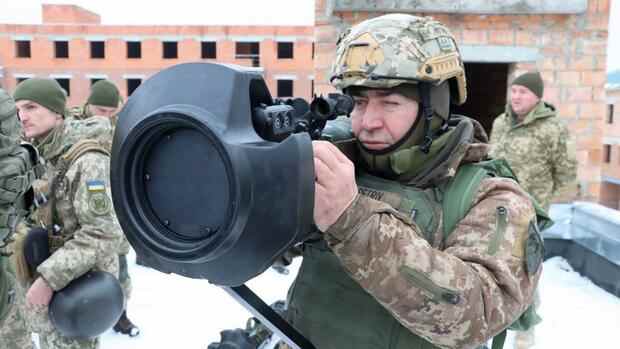London has equipped the country with state-of-the-art anti-tank systems.
(Photo: action press)
Vienna Despite the demonstrative calm with which Ukraine reacted to the Russian deployment at the border, the security situation is extremely precarious. Kiev is sticking to the goal of joining the EU and NATO. But the government knows that this is a long way off – the Americans and Europeans want to avoid the risk of a direct armed conflict with Russia at all costs.
The western alliance and the USA are therefore strengthening their presence along Ukraine’s western border: They are expanding military contingents in Poland, Romania and the Baltic States and are planning new NATO combat groups in Slovakia and Bulgaria.
For its part, Ukraine is relying on so-called small alliances to deter Russia, as Foreign Minister Dmitro Kuleba explains. “We cannot expect security and prosperity sometime in the future when we become members of the EU and NATO. We need them now.”
Last week, Kiev formalized an alliance with London and Warsaw, both of which are among its top foreign backers. It supplements existing regional formats such as the “Lublin Triangle” between Ukraine, Poland and Lithuania.
Top jobs of the day
Find the best jobs now and
be notified by email.
>> Read also: Lessons from Moscow: Europe must make its defensive strength the central issue
Armaments cooperation with Turkey, which supplied the Eastern European country with combat drones under protest from Moscow, is also part of the “small alliances” strategy. Then there is the “Associated Trio” together with Georgia and Moldova.
The trilateral partnership with Poland and Great Britain aims to support Ukraine’s sovereignty, independence and territorial integrity. The focus is on security cooperation – it is about weapons, gas supplies and the fight against disinformation, it said at the announcement in Kiev. However, there is no provision for an obligation to provide assistance analogous to NATO.
We cannot expect security and prosperity sometime in the future when we become members of the EU and NATO. We need them now. Ukrainian Foreign Minister Dmitro Kuleba
For Ukraine, this means that its 250,000 active soldiers and 200,000 reservists would have to fight a war with Russia alone. The Polish-Ukrainian-Lithuanian brigade with its 4,500 men would be operational and has repeatedly taken part in international exercises, but will hardly be used due to the delicate combination of NATO and non-NATO troops.
The alliances offer additional political backing, which not least facilitates arms deliveries: This does not mean, however, that all arms suppliers are bound to Ukraine with alliances – France, for example, sees itself as an important mediator vis-à-vis Russia.
After Paris, Warsaw is the second most important supplier with arms deals worth more than 650 million euros between 2014 and 2020.
This volume is now being expanded rapidly, and Polish military circles can imagine further softening the always somewhat theoretical distinction between defensive and offensive weapons.
The British Foreign Secretary pledged support to her Ukrainian counterpart on Thursday.
(Photo: dpa)
According to a former deputy secretary of defense, a tank can also be used for defense, depending on the context. The delivery of large quantities of ammunition for anti-aircraft guns and surface-to-air missiles has already begun.
For a long time, Great Britain had been reluctant to deliver arms and in the six years after the annexation of Crimea only sold equipment to Kiev for 31 million euros.
This has changed radically: in January, the Ukrainian parliament ratified a deal worth the equivalent of more than two billion francs to buy ships for the navy from the British.
Missiles and financial support in the hundreds of millions
Under the impression of the escalating conflict, London also sent anti-tank missiles. The new trilateral agreement brings with it additional financial support in the hundreds of millions.
The growing number of alliances adds to the confusion surrounding Ukraine, but also increases its maneuverability. This is all the more important for Kiev since important NATO members like Germany are holding back. They have little interest in being dragged deeper into the geopolitical quicksand than is absolutely necessary.
Great Britain, on the other hand, seems determined to take a clear political position. Ukraine and neighboring Poland, on the other hand, know from past experience that standing onside is not an option given Russia’s superiority.
More: Why Russia’s military fears Turkish drones in Ukraine.
